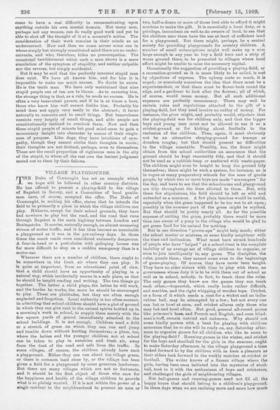STUPIDITY.
AGREAT many—too many—excuses are made for stupidity. In nine cases out of ten it is a serious moral defect, and people can help being stupid just as much and just as little as they can help being grasping, or spiteful, or ill-tempered. They have a tendency to mental inertia, and if they do not enjoy, they at least acquiesce in it. Oddly enough, though so unattractive a quality, it is one of those Which many persons constantly attribute to themselves, and that without joking. They find a confession of stupidity a ready defence against the duty of thought, the onset of scruples, and the demand of the world for sympathy. This culpable stupidity, though equally common in the two sexes, takes somewhat different forms in men and in women. How often do we hear a woman say : " I am too stupid, really, to understand the question." Should any one be so rash as to endeavour to explain it to her, he will, indeed, find her apparently dense, yet all the while she is pressing, and pressing with energy and ability, a ready-made conclusion, :1'1°11 has to her mind no foundation in reason whatever. She shows by her efforts a good sense which would enable her to grasp the matter in question as well as any one else ; but thought often leads one to awkward results, and she finds it comfortable refuge in her own stupidity. All sane and honest suffragists must often think sadly of these women, whose name is legion. Of course, upon persons of naturally active mind all. current questions force themselves; but they one may also say that the naturally generous feel no tempts, tion to take any advantage in any species of dealing ; but that is a fact iu favour of human nature which oonstitutee no excuse for a cheat. Again, how many women tern a stupid ear to the many mixed problems of charity and economy. They will be charitable for the same reason that they will be fashionable,—in order to give themselves a pleasant sensation without any consideration of whether they are doing good or harm. They are too stupid to understand why not. Their friends say that their hearts are better than their heads. As a matter of fact, their generosity has little
more connexion with virtue than has their finery. They have an instinct to save themselves from a knowledge which is difficult of acquirement, or productive of the slightest mental discomfort or personal saerifice. They do not ever say all this to themselves ; they simply accept all the advantage which can be obtained from their own want of right curiosity and swift comprehension.
Take another instance which one meets every day of culpable stupidity, the people who always manage to say the wrong thing. Here men are greater sinners than women. This is a particular in which the best of us offend at times.
Who has not heard with the ears of his mind the horrid crash which follows on the accidental destruction of the harmony of the moment P But the stupid do not hear this discordant noise, or, rather, it is as pleasurable to them as actual din is to savages. They have no sooner said what those listeners who knew them were hoping against hope that they
would not say than they perceive that they have made a sensation. They did not mean to do it, but, like those tiresome children who enjoy a scene, they do mean to do it again. It
is extraordinary, how often one hears stupid persons repeat
the :stupid things that they have said, adding : "So-and-so didn't quite like it." Why they repeat a thing to their own
disadvantage it is bard to say. One can only suppose that they did enjoy the sensation they produced, and want to have it over again in memory and to emphasise it by repetition out loud. There is a stupidity which takes the form of sentimentality, bringing kindness into ridicule among hard- headed people, and casting a blight of silliness over the good works of the humane. Self-control is the only soil in which sense will grow, and the sentimentalist will not cultivate it. One great argument in favour of the theory that stupidity is for the most part culpable is that so few people are stupid where their own immediate interest is concerned. They can concentrate their minds in a moment when that comes before them. The person who is careless of his own interest, or appears even very stupid on the subject, is almost never stupid about anything else. There is a particular sort of ability which seems to be a complete solvent of self-interest, and there is a sort of stupidity which renders it adamant.
One exasperating form of stupidity is what one may call class stupidity. There are people who never seem able to understand the mental position of those whose upbringing and surroundings are not the same as theirs. They do not judge every one by the same standard as themselves. If they did, they would not be so far out, for, after all, human
nature is fundamental, and distinctions of a social kind are superficial. They err in quite a different direction. They
have in their own minds what one might call typical dummies representing every class, and they believe that all who belong to any particular class approach to their preconceived notion of what that class produces. If they repeat the words of an uneducated person, they repeat is mass of grammatical mistakes and mispronunciations quite other than those in common use. They expect certain faults of them, and, what is more insulting, they have always by them a score of excuses for those faults. The least effort of mind and sympathy would show them that they are altogether astray from the facts, but they will not make the effort. All this is no less true when the stupid person looks up instead of down. If the dummy whom he has labelled " social superior" is ugly, he hates every one Le meets whom be suspects of social distinction ; if, on the other hand, his preconception is beautiful, he becomes a snob. It is inevitable that the specialisation of to-day should tend to a false appearance of stupidity. A man whose mind is habitually turned in one direction, and kept in one attitude with all the force of his will-power, may easily come to have a real difficulty in reconcentrating upon anything outside his own mental domain. Not many men, perhaps not any women, can do really good work and yet be able to shut off the thought of it at a moment's notice. The consideration of their work remains in their minds as an undercurrent. Now and then we come across some one in whose simply but strongly constituted mind there are no under- currents, and who, therefore, hides no preoccupation. The occasional bewilderment which such a man shows is a mere simulation of the symptom of stupidity, and neither culpable nor the reverse, but simply accidental.
But it may be said that the perfectly innocent stupid man does exist. We have all known him, and for him it is impossible to make too much excuse. No doubt be exists. He is the tenth man. We have only maintained that nine stupid people out of ten are to blame. As to excusing him, the strange thing is that, as a rule, he needs no excuse. He is often a very benevolent person, and if he is at times a bore, those who know him well cannot dislike him. Probably his mind does not apply very easily in the abstract ; it turns naturally to concrete and to small things. But benevolence consists very largely of small things, and able people are constitutionally inclined to overlook them. Now and then these stupid people of minute but good mind seem to gain a momentary insight into character by means of their single- ness of purpose. Like dogs, they have intuitions of sym- pathy, though they cannot clothe their thoughts in words; their thoughts are not distinct, perhaps, even to themselves. These are the small proportion of righteous men in the city of the stupid, to whom all the rest owe the lenient judgment meted out to them by their fellows.










































 Previous page
Previous page